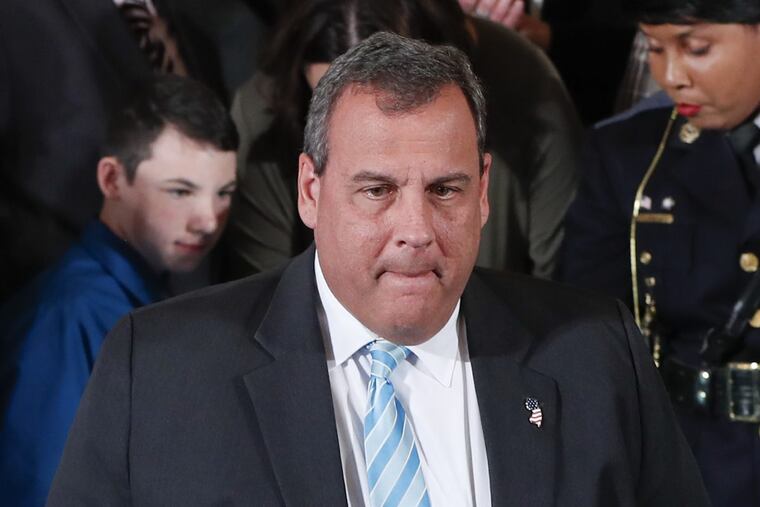On this election night, Chris Christie emerged as a clear loser
Kim Guadagno ran away from him. Phil Murphy ran against him. He leaves office in January, his onetime presidential ambitions seeming very long ago.

Back when Gov. Christie was a rock star, journalists describing his personality as larger than life would face "fat-shaming" accusations from the big man's fans and foes alike.
It was morning in Trenton. The state capital and the Garden State itself seemed livelier and more consequential with the smaller-than-life Jon Corzine administration done and the Christie craze having begun.
The new governor seemed like a Jersey Fresh sort of Republican, a dude with attitude and blue-collar brio who was unafraid, if not eager, to go against the grain for the greater good. And New Jersey provided a compelling backdrop for a witty, entertaining, seemingly real-deal politico of intimidating charm and enormous ambition.
Heady were the days when Christie's expertly orchestrated roadshow, a taxpayer-funded traveling "town hall," rolled across the state and lured not just the faithful but converts into what looked like a big and bigger tent.
One early stop was top Democrat Steve Sweeney's home turf of West Deptford, an in-your-face strategic move by a Republican governor who proved himself a peerless natural performer, one equally adept at disarming you in your own backyard, on NJ 101.5's Ask the Governor, or on late-night TV.
Christie and Sweeney went on to have a star-crossed, if old-fashioned, political bromance of the sort conducted over steak dinners and cigars. The governor's pragmatic flair for bipartisan showmanship even sparked an unlikely, enduring — and in some eyes unholy — alliance with Democratic chieftain George Norcross.
And such was the electric atmosphere around Christie in 2011 that an asthma attack leading to the governor's brief hospitalization made national news.
Would he still be able to run for president in 2012?
A mere five years later, all that hoopla seems inexplicable. Particularly in the wake of a terminally low-octane gubernatorial campaign in which the Republican candidate, Lt. Gov. Kim Guadagno, spent much of her time distancing herself from Christie while the victorious if colorless Democrat Phil Murphy ran against her by running against him.
Christie's name was not actually on the New Jersey ballot, so the other off-year gubernatorial race, the one in Virginia, proved far more interesting to the national media. The big New Jersey story remained the unappetizing trial of Democratic Sen. Bob Menendez in Newark, a proceeding that could in fact have national ramifications.
Christie, meanwhile, leaves office in January amid historically low approval ratings attributable largely to a series of calamities, many of them self-inflicted. The spotlight he loved, and that loved him back, has shifted from flattering to merciless. And the seams in his show — particularly the governor's belligerence, defensiveness, and penchant for sucking up to celebrities — are now garishly visible.
Even his weight is fair game, as summer's cruel, if amusing, meme of a shorts-clad Christie in a beach chair attested.
Perhaps the most dramatic event in the governor's shifting fortunes was Hurricane Sandy. His administration's assiduously crafted "Jersey Strong" narrative of tragedy turned triumph looks decidedly less than triumphant on the fifth anniversary of a disaster with stubbornly lingering effects.
Other political controversies — most egregiously, his transformation of the Pinelands Commission into the Pinelands Pipeline Commission — have eroded the governor's credibility and popularity as well.
But the most cinematic of Christie's career-extinguishing travails was a double feature: Bridgegate, the optics of which appear too petty, pointless, and mean-spirited even for New Jersey, and his ill-advised and even more ill-fated 2016 presidential campaign,
Even worse was the abject spectacle that followed: Christie not only embracing Donald Trump, which is bad enough, but obsequiously seeking a position in the new president's White House.
The symbolically significant, but effectively minimal, impact so far of Christie's role as Trump's top adviser on the opioid epidemic is a reminder that the governor was a forthright advocate of more and better treatment of addiction long before opioid was a household word.
Christie stubbornly and admirably took his own path — his genuine and respectful partnership with Camden Mayor Dana L. Redd comes to mind — in other ways as well.
This complicated man rocked and ruled a complicated state for eight years, I'm not sure what his legacy will be, but I do know that the Christie era had barely a dull moment.
It's time for a break. For you too, Governor.